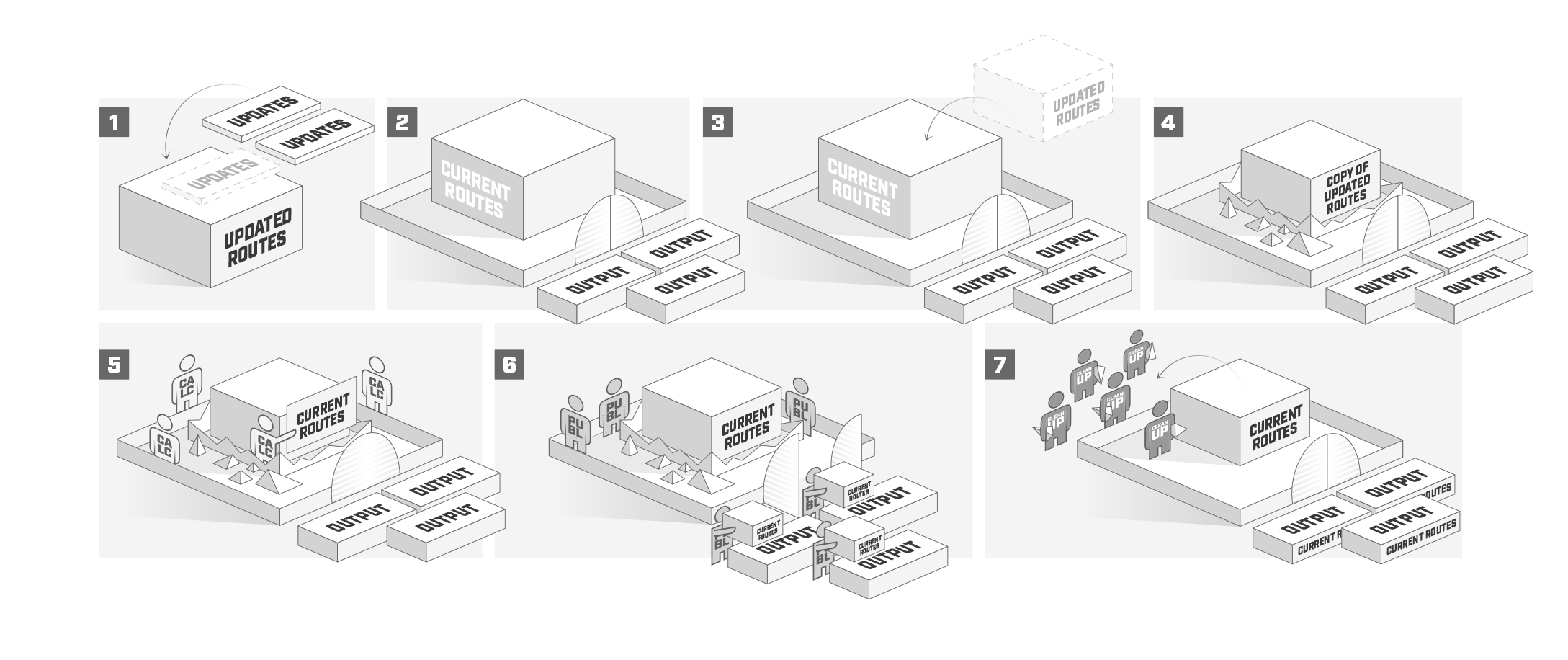
RouterOS v7 is capable of splitting tasks between multiple processes.
There is one "main" task, which can start/stop sub-tasks and process data between those sub-tasks. Each sub-task can allocate "private" (only accessible by this particular task) and "shared" memory (accessible by all route tasks).
List of tasks that can be split:
BGP receive and send can be split into sub-tasks by specific parameters, for example, it is possible to run input per each peer or group all peer inputs and run them in the main process. This split by sub-tasks is controlled with input.affinity and output.affinity parameter configuration in /routing/bgp/template.It is possible to boost performance by playing with affinity values on devices with fewer cores since sharing data between tasks is a bit slower than processing the same data within one task. For example, on single-core or two-core devices running input and output in the main or instance process will boost performance.
BGP can have up to 100 unique processes. |
All currently used tasks and their allocated private/shared memory can be monitored using the command:
/routing/stats/process/print |
Sample Output:
[admin@BGP_MUM] /routing/stats/process> print interval=1
Columns: TASKS, PRIVATE-MEM-BLOCKS, SHARED-MEM-BLOCKS, PSS, RSS, VMS, RETIRED, ID, PID, RPID, PROCESS-TIME, KERNEL-TIME, CUR-BUSY, MAX-BUSY, CUR-CALC, MAX-CALC
# TASKS PRIVATE-M SHARED-M PSS RSS VMS R ID PID R PROCESS- KERNEL-TI CUR- MAX-BUSY CUR- MAX-CALC
0 routing tables 11.8MiB 20.0MiB 19.8MiB 42.2MiB 51.4MiB 7 main 195 0 15s470ms 2s50ms 20ms 1s460ms 20ms 35s120ms
rib
connected networks
1 fib 2816.0KiB 0 8.1MiB 27.4MiB 51.4MiB fib 255 1 5s730ms 7m4s790ms 23s350ms 23s350ms
2 ospf 512.0KiB 0 3151.0KiB 14.6MiB 51.4MiB ospf 260 1 20ms 100ms 20ms 20ms
connected networks
3 fantasy 256.0KiB 0 1898.0KiB 5.8MiB 51.4MiB fantasy 261 1 40ms 60ms 20ms 20ms
4 configuration and reporting 4096.0KiB 512.0KiB 9.2MiB 28.4MiB 51.4MiB static 262 1 3s210ms 40ms 220ms 220ms
5 rip 512.0KiB 0 3151.0KiB 14.6MiB 51.4MiB rip 259 1 50ms 90ms 20ms 20ms
connected networks
6 routing policy configuration 768.0KiB 768.0KiB 2250.0KiB 6.2MiB 51.4MiB policy 256 1 70ms 50ms 20ms 20ms
7 BGP service 768.0KiB 0 3359.0KiB 14.9MiB 51.4MiB bgp 257 1 4s260ms 8s50ms 30ms 30ms
connected networks
8 BFD service 512.0KiB 0 3151.0KiB 14.6MiB 51.4MiB 12 258 1 80ms 40ms 20ms 20ms
connected networks
9 BGP Input 10.155.101.232 8.2MiB 6.8MiB 17.0MiB 39.1MiB 51.4MiB 20 270 1 24s880ms 3s60ms 18s550ms 18s550ms
BGP Output 10.155.101.232
10 Global memory 256.0KiB global 0 0 |
Illustration below tries to explain in more user friendly form on how routing table update mechanism is working.

Routing protocols continuously loop through following procedures:
Consider "updated" and "current" as two copies of routing table, where "current" table (2) is the one used at the moment and "updated" (1) is table of candidate routes to be published in the next publish event (3 and 4). This method prevents protocols to fill memory with buffered updates while "main" process is doing "publish", instead protocols sends the newest update directly to "main" process which then copies new update in "updated" table. A bit more complicated is OSPF, it internally has similar process to select current OSPF routes which then are sent to the "main" for further processing.